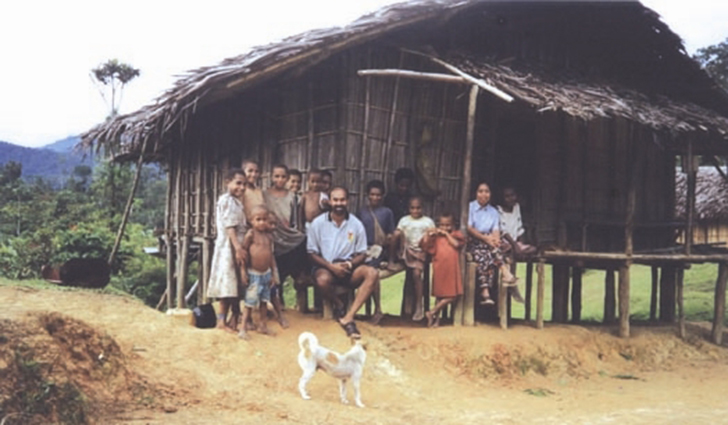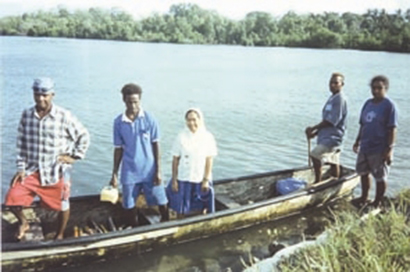From The Mountains To The Seas
By Sister Elisa C Caballero OND

Sr Elisa on one of her home patrols in a remote village in Papua New Guinea
On 4 July 1995 I arrived in Papua New Guinea with great hopes and open to encountering a new culture and environment. I welcomed the many experiences of culture shock. After a few months of adjustment, and learning to speak Pidgin English, known in PNG as ‘Tok Pisin,’ I learned to let go, accept and understand the realities of mission life.
My first assignment was in Our Lady of the Star Mountains Parish, in a big mining town at the head of a valley where expatriates and local people are working hand in hand to make the Church alive and responsive to their life situation. After six months of easy mission life there, surrounded by modern facilities provided by the mining company, I was transferred to the high mountains. This gave me great joy for it was my wish to really live closely with the local people.

In the Solomon Islands, Sr Elisa travels by canoe
Thus, I started my journey with the people of the Min tribe in St Andrew Parish, set up in December 2000, or the ‘Mountains Parish’ as it’s called since it’s composed of far-flung villages across a mountain range. As the Parish Sister there for six years, I was involved in pastoral programs for the women, youth, catechists and prayers leaders, and in community organizing. I had no fixed structure to follow. Our ministry depended on the movement of the people, on the unpredictable weather and on events in the community such as deaths, births, planting, harvesting and so on. It was a ministry not so much of doing something for the people but of being with them . . . ‘wasting time’ with them, sharing their struggles, hopes and dreams for a better life. Most of the time, we were on the move from one village to another, traveling by small plane and often by foot across rugged mountains, valleys and swift rivers. It was during these ‘patrols,’ or pastoral visitations, that I gained a deep understanding of the culture of the people. I grew in patience with the endless waiting for the people, for the fog to clear, for the rain to stop, for flooded rivers to go down, for the plane to come, for changes to happen, and so on. My years with the mountain people made my heart sensitive to what people really care about, what matters most to them and what makes their lives meaningful, as well as what really matters most in my life as a missionary.
It was painful for me to say goodbye to the beautiful blue-green mountains and to all the people there who had become part of my life. With faith in God who constantly calls us to new life and surprises, I accepted a new assignment in January 2002, to a totally new life for me surrounded by the vast seas of the Solomon Islands. Here, I have no mountains, not even a small hill, to climb, no more cool, foggy and rainy days but sunny days with a very hot sun shining gloriously everyday. I also found myself in a very structured ministry of managing the Diocesan Pastoral Centre. I’m involved in planning formation courses for Church leaders, especially catechists, as well as budgeting and teaching.
The catechists in this very male-dominated society are all married men. They have a very important role in their communities as village and church leaders, and are responsible for almost every affair in the community and for the development of the faith life of the people. It is very challenging to facilitate an effective formation process for them. It wasn’t easy to teach them because of their cultural bias against women. During my first few months I was criticized and humiliated just because I was a woman. They couldn’t accept a woman managing a pastoral center and teaching them. However, there was a gradual change in their attitude towards me as well as a change in my way of relating to them. It’s still difficult to change their whole mentality with regards to women, but there is a growing awareness of the role and importance of women in their families and community. And my being a religious sister and missionary helped break the barrier. I hope and pray that someday women catechists will have a place in their Christian communities.
As a country, the Solomon Islands is still struggling to recover from the socio-economic and political collapse brought about by ethnic clashes from 1998 to 2000 and by massive corruption in the government. Economic recovery is very slow but peace and order has been restored with the assistance of peacekeeping forces from other Pacific nations led by Australia and New Zealand. It is indeed a real challenge for us missionaries here to journey with the people towards a better future and to recover their once ‘Happy Isles’ where people lived with dignity and in harmony with one another. However, in favor of localization, our OND missionary presence here is until this year only. It is indeed a sign of hope to see the local Church grow and take responsibility for ministries looked after by missionaries for many years.
Leaving a mission area is not easy . . . it always breaks my heart to say goodbye to people I’ve learned to love and who have helped me discover our Living and Loving God in the context of their culture. But I have to let go and be open to the Spirit to lead me to another place and to another people . . . for I always believe that God is with us wherever we are sent . . . and that God is in another place and in another face.